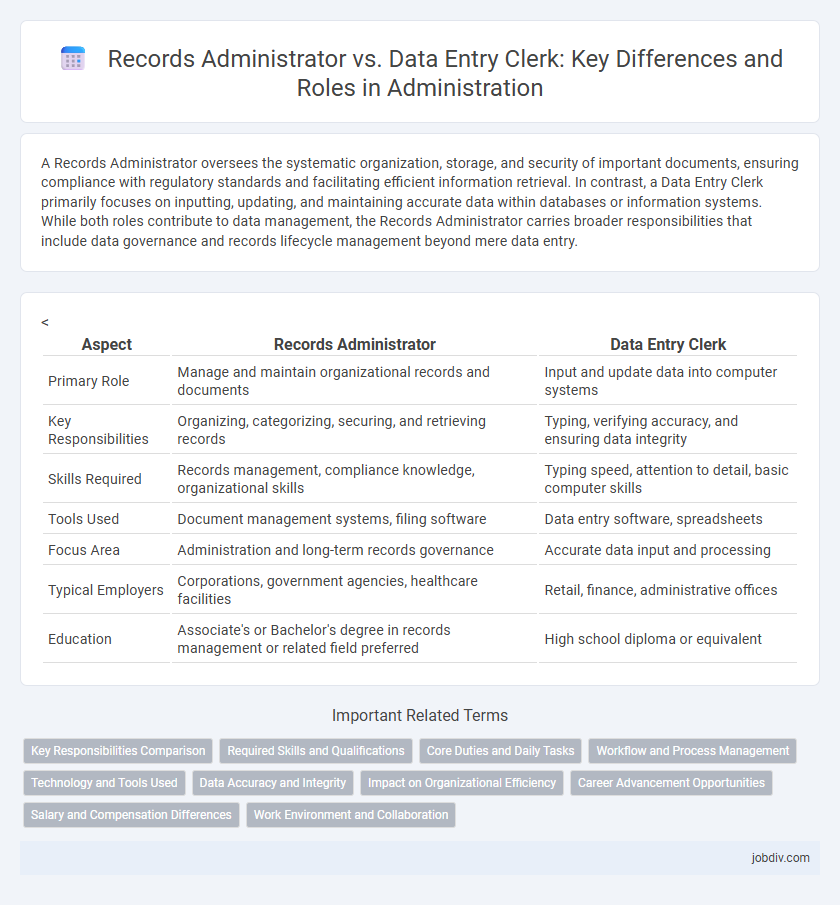A Records Administrator oversees the systematic organization, storage, and security of important documents, ensuring compliance with regulatory standards and facilitating efficient information retrieval. In contrast, a Data Entry Clerk primarily focuses on inputting, updating, and maintaining accurate data within databases or information systems. While both roles contribute to data management, the Records Administrator carries broader responsibilities that include data governance and records lifecycle management beyond mere data entry.
Table of Comparison
| Aspect | Records Administrator | Data Entry Clerk |
|---|---|---|
| Primary Role | Manage and maintain organizational records and documents | Input and update data into computer systems |
| Key Responsibilities | Organizing, categorizing, securing, and retrieving records | Typing, verifying accuracy, and ensuring data integrity |
| Skills Required | Records management, compliance knowledge, organizational skills | Typing speed, attention to detail, basic computer skills |
| Tools Used | Document management systems, filing software | Data entry software, spreadsheets |
| Focus Area | Administration and long-term records governance | Accurate data input and processing |
| Typical Employers | Corporations, government agencies, healthcare facilities | Retail, finance, administrative offices |
| Education | Associate's or Bachelor's degree in records management or related field preferred | High school diploma or equivalent |
Key Responsibilities Comparison
Records Administrators oversee the systematic organization, maintenance, and protection of company documents, ensuring compliance with regulatory standards and facilitating easy retrieval. Data Entry Clerks focus on accurately inputting data into digital systems, verifying information, and maintaining data integrity during entry processes. Both roles are essential for effective information management, but Records Administrators handle higher-level document control and policy enforcement while Data Entry Clerks concentrate on precise data transcription and input efficiency.
Required Skills and Qualifications
Records Administrators require expertise in records management, metadata standards, and information governance, often holding certifications like Certified Records Manager (CRM). Data Entry Clerks primarily need fast and accurate typing skills, familiarity with data management software, and attention to detail, typically requiring a high school diploma or equivalent. Both roles benefit from strong organizational abilities and proficiency in database systems, but Records Administrators demand advanced knowledge of compliance and archival procedures.
Core Duties and Daily Tasks
Records Administrators manage the organization, maintenance, and retrieval of company records, ensuring compliance with data protection regulations and facilitating efficient information access. Data Entry Clerks specialize in inputting, updating, and verifying data accuracy in databases or information systems, focusing on speed and precision. Both roles require attention to detail, but Records Administrators emphasize record lifecycle management while Data Entry Clerks concentrate on accurate data input and correction.
Workflow and Process Management
Records Administrators oversee workflow optimization and process management by implementing standardized procedures for document retention, classification, and retrieval, ensuring compliance with regulatory requirements. Data Entry Clerks focus on accurately inputting data into systems, supporting workflow efficiency through timely updates but with limited involvement in process design or document lifecycle management. Effective administration relies on the Records Administrator's strategic management combined with the Data Entry Clerk's operational accuracy to maintain seamless information flow.
Technology and Tools Used
Records Administrators utilize robust document management systems, electronic records management software, and compliance tools to organize, secure, and retrieve critical organizational data. Data Entry Clerks primarily rely on data input software, spreadsheets, and keyboarding tools to accurately input information into databases or systems. Both roles require proficiency with digital technologies, yet Records Administrators emphasize record integrity and regulatory adherence, whereas Data Entry Clerks focus on speed and accuracy in data transcription.
Data Accuracy and Integrity
A Records Administrator ensures data accuracy and integrity by implementing robust record-keeping systems and conducting regular audits to verify information consistency. In contrast, a Data Entry Clerk primarily focuses on the accurate input of data, emphasizing precision in capturing information from various sources. Together, their roles complement each other in maintaining reliable and error-free administrative data management.
Impact on Organizational Efficiency
Records Administrators enhance organizational efficiency by implementing structured document management systems, ensuring compliance with data retention policies, and facilitating quick retrieval of critical information. Data Entry Clerks contribute by accurately inputting and updating data, which supports real-time access to essential records and reduces errors. Together, these roles optimize information flow and streamline administrative processes, resulting in improved operational productivity.
Career Advancement Opportunities
Records Administrators often have greater career advancement opportunities compared to Data Entry Clerks due to their involvement in managing, organizing, and protecting critical organizational information, which requires specialized knowledge in records management systems and compliance regulations. Data Entry Clerks primarily focus on inputting and updating data, a role that tends to be more entry-level with limited scope for upward mobility without additional training or education. Professionals aiming for career growth in administration should consider gaining expertise in data governance, information management policies, and technology systems to transition from data entry roles to records administration or higher managerial positions.
Salary and Compensation Differences
Records Administrators typically earn an average salary of $50,000 to $70,000 annually, reflecting their responsibility for managing and safeguarding organizational records. Data Entry Clerks generally receive lower compensation, with salaries ranging from $30,000 to $45,000 per year, due to the more task-focused nature of their role. Benefits packages for Records Administrators often include performance bonuses and professional development opportunities, whereas Data Entry Clerks usually receive standard wage-based compensation with limited additional incentives.
Work Environment and Collaboration
Records Administrators typically work in office settings within organizations such as hospitals, government agencies, or corporate offices, collaborating closely with managers and IT personnel to maintain data integrity and compliance. Data Entry Clerks often operate in similar environments but focus on inputting information accurately, usually under supervision and with limited interaction beyond their immediate team. Both roles require attention to detail, but Records Administrators engage more in cross-departmental collaboration to manage records systems effectively.
Records Administrator vs Data Entry Clerk Infographic

 jobdiv.com
jobdiv.com